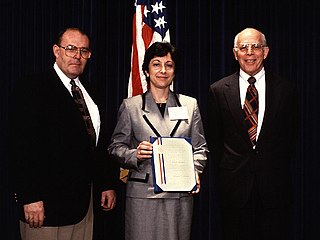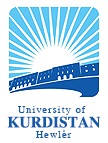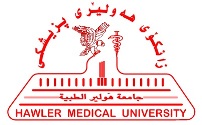Related Research Articles

Erbil Governorate is a governorate in the Kurdistan Region. It is the capital and economic hub of the semi-autonomous Kurdistan Region of Iraq.

Peter Agre is an American physician, Nobel Laureate, and molecular biologist, Bloomberg Distinguished Professor at the Johns Hopkins Bloomberg School of Public Health and Johns Hopkins School of Medicine, and director of the Johns Hopkins Malaria Research Institute. In 2003, Agre and Roderick MacKinnon shared the 2003 Nobel Prize in Chemistry for "discoveries concerning channels in cell membranes." Agre was recognized for his discovery of aquaporin water channels. Aquaporins are water-channel proteins that move water molecules through the cell membrane. In 2009, Agre was elected president of the American Association for the Advancement of Science (AAAS) and became active in science diplomacy.
Civilian Research and Development Foundation (CRDF) Global is an independent nonprofit organization that promotes safety, security, and sustainability through science and innovation. CRDF Global was authorized by the U.S. Congress in 1992 under the FREEDOM Support Act and established in 1995 by the National Science Foundation. This unique public-private partnership promotes international scientific and technical collaboration through grants, technical resources, and training. CRDF Global was originally named the U.S. Civilian Research and Development Foundation for the Independent States of the Former Soviet Union (CRDF).

The Erbil Citadel locally called Qalat, is a tell or occupied mound, and the historical city centre of Erbil in the Kurdistan Region of Iraq. The citadel has been included in the World Heritage List since 21 June 2014.
A virtual observatory (VO) is a collection of interoperating data archives and software tools which utilize the internet to form a scientific research environment in which research programs can be conducted. Historically addressing astronomical subjects, space physics and geosciences have also been a focus of VO development.

John Howard "Jack" Gibbons was an American scientist, nuclear physicist, and internationally recognized expert in technologies for energy efficiency and energy resource conservation. He served as the assistant to the president for science and technology and director of the White House Office of Science and Technology Policy under President Bill Clinton from 1993 to 1998.

Iraq, officially the Republic of Iraq, is a country in West Asia and a core country in the geopolitical region known as the Middle East. With a population of over 46 million, it is the 35th-most populous country. A federal parliamentary republic, it consists of 18 governorates. Iraq is bordered by Turkey to the north, Saudi Arabia to the south, Iran to the east, the Persian Gulf and Kuwait to the southeast, Jordan to the southwest, and Syria to the west. The capital and largest city is Baghdad. Iraqi people are diverse; mostly Arabs, as well as Kurds, Turkmen, Yazidis, Assyrians, Armenians, Mandaeans, Persians and Shabakis with similarly diverse geography and wildlife. Most Iraqis are Muslims – minority faiths include Christianity, Yazidism, Zoroastrianism, Mandaeism, Yarsanism and Judaism. The official languages of Iraq are Arabic and Kurdish; others also recognized in specific regions are Turkish, Suret, and Armenian.
The Dictionary of Scientific Biography is a scholarly reference work that was published from 1970 through 1980 by publisher Charles Scribner's Sons, with main editor the science historian Charles Gillispie, from Princeton University. It consisted of sixteen volumes. It is supplemented by the New Dictionary of Scientific Biography (2007). Both these publications are included in a later electronic book, called the Complete Dictionary of Scientific Biography.
Since the 2003 invasion of Iraq, Iraqi academics have frequently been threatened with violence, kidnapped, or murdered. Although it is impossible to determine the exact scale of the violence and intimidation, the Iraqi Ministry of Higher Education reported that over 3,250 academics had fled the country between February and August 2006. According to the Iraqi Association of University Lecturers about 300 academics, including Ph.D.'s working in Iraqi government ministries and university administrators, had been killed before January, 2007. Other, less reliable, sources have placed the death toll as low as 20 and as high as 1,000.

The University of Kurdistan Hewlêr (UKH) is an educational institution in Erbil/Hewlêr, the Kurdistan Region of Iraq. UKH is a public university that was established in 2006. The University Of Kurdistan Hewler obtained top ranking throughout the Region in 2018.

Hawler Medical University is a public university located in the heart of Erbil, the capital city of the Kurdistan Region of Iraq. It was established in 2005 by the Kurdistan Regional Government's Council of Ministers. The university was founded to house the medical group colleges that were previously part of the Salahaddin University-Erbil. The overall goal of Hawler Medical University's formation was to strengthen medical education in the Kurdistan region, as well as to have better and more effective college management.
Saad Eskander is a contemporary Iraqi Kurdish academic and researcher. He was born in Baghdad, joined the Kurdish Peshmerga in 1981 and lived in the mountains of Iraqi Kurdistan for four years, then moved to Iran and Syria.

Erbil, also called Hawler, is the capital and most populated city in the Kurdistan Region of Iraq. The city is in the Erbil Governorate.
The Maghreb Virtual Science Library(MVSL)(la Bibliothèque numérique des sciences du Maghreb المكتبة العلمية الافتراضية المغاربية ) provided full-text access to thousands of science and engineering journals and databases to researchers in the Maghreb via digital library portals. It was a project funded by the U.S. Department of State Bureau of Oceans & International Environmental and Scientific Affairs, and is implemented by CRDF Global along with IMIST (Institut Marocain de l'Information Scientifique et Technique), LibHub, Research4Life, and JSTOR.

The Iraqi–Kurdish conflict consists of a series of wars, rebellions and disputes between the Kurds and the central authority of Iraq starting in the 20th century shortly after the defeat of the Ottoman Empire in World War I. Some put the marking point of the conflict beginning to the attempt by Mahmud Barzanji to establish an independent Kingdom of Kurdistan, while others relate to the conflict as only the post-1961 insurrection by the Barzanis.
Erbil Polytechnic University is a public polytechnic university in Erbil, Kurdistan founded in 1996. The university is recognized by the Ministry of Higher Education and Scientific Research, Kurdistan Regional Government.

The following is a timeline of the history of the city of Erbil, Kurdistan Region.
The International University of Erbil is an educational institution in Erbil, the flourishing capital of the Kurdistan Region, Iraq. It was established in 2009 after being restructured and named into a new entity. The university has a former name called Sabis University founded in 2007. The university obtained full accreditation from the Iraqi Ministry of Higher Education and Scientific Research In Baghdad
References
- ↑ "University of Maryland Scientist Leads Creation of Virtual Science Library for Iraq". AScrive Science News Service. 2006-05-01. Retrieved 2008-09-09.
- ↑ Steven Donald Smith (2006-05-04). "Virtual Library Gives Iraqi Scientists Access to Valuable Knowledge". The Conservative Voice. Archived from the original on 2011-05-27. Retrieved 2008-09-09.
- ↑ "Rebuilding Iraqi Science". NPR. 2006-06-23. Retrieved 2008-09-09.
- ↑ Iraqi Libraries and Archives in Peril: Survival in a time of Invasion, Chaos, and Civil Conflict, A Report http://archnet.org/library/documents/one-document.jsp?document_id=10241 Archived 2007-12-24 at Archive-It
- ↑ AAAS News Release Virtual Library Offers Reams of Data—and Hope—to Embattled Iraqi S&T Community http://www.aaas.org/news/releases/2006/0509iraq.shtml Archived 2009-05-31 at the Wayback Machine
- ↑ "University of Maryland Scientist Spearheads Creation of Iraqi Virtual Science Library". Computers in Libraries. 2006-07-01. Retrieved 2008-09-09.
- ↑ "JSTOR Teams up with Iraqi Virtual Science Library". Information Today. 2006-09-01. Retrieved 2008-09-09.
- ↑ "The Iraqi Virtual Science Library". U.S. Department of State Archive. June 5, 2006. Archived from the original on February 5, 2009. Retrieved June 4, 2022.
- 1 2 "Scientist Leads Creation of Virtual Science Library for Iraq | Newswise: News for Journalists". www.newswise.com. Retrieved 2019-03-08.
- ↑ "Iraqi Educators Reconnect via Virtual Library". International Educator. 2006-07-01. Archived from the original on 2012-10-21. Retrieved 2008-09-09.
- 1 2 Marlow, Jeffrey (2013-10-18). "The Secret Behind Iraq's Scientific Resurgence". Wired. ISSN 1059-1028 . Retrieved 2019-03-08.
- ↑ CRDF Fact Sheet: Iraqi Virtual Science Library: http://www.crdf.org/factsheets/factsheets_show.htm?doc_id=676089 Archived 2009-09-03 at the Wayback Machine